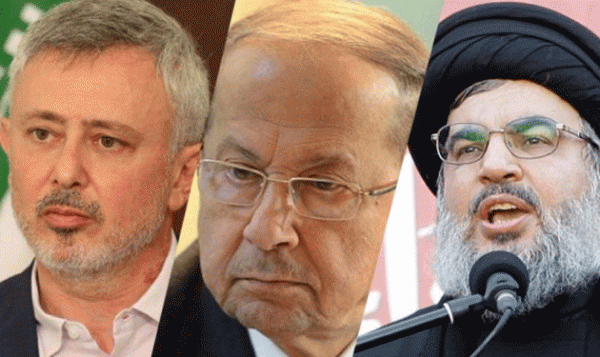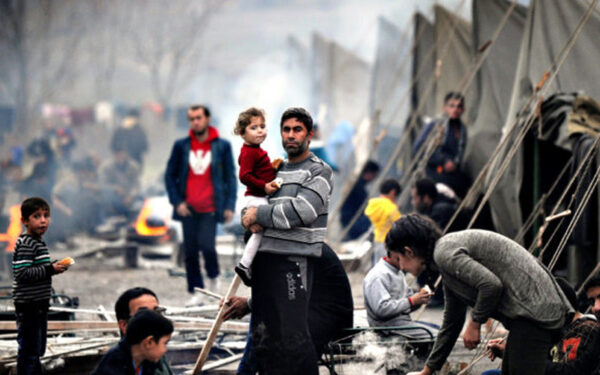BEIRUT: Former Lebanese President Michel Aoun said on Sunday that the continued presence of Syrian refugees in Lebanon was “a conspiracy against Lebanon.”
He described them as “security refugees and not political refugees,” at an event held by the Free Patriotic Movement in the southern town of Jezzine.
He also said that many countries were behind the Syrian refugees’ entry into Lebanon after pressuring Beirut.
“I am not ashamed of saying that the majority of European countries don’t want to receive the refugees and are forcing us to keep them here,” he said.
“What is even more dangerous is that friendly European countries are imposing illegal things on us. They want to integrate the Syrian refugees into the Lebanese society.”
Syrian refugee presence ‘a conspiracy against Lebanon,’ former president claims
Given the political divergence seen in Lebanon regarding the Syrian revolution back in 2011, Lebanon had dealt with the Syrian refugee case with denial through its official state institutions.
Following Hezbollah’s participation in the Syrian war in 2012, the number of Syrian refugees increased in Lebanon, namely refugees coming from the regions of Al-Qusayr and Qalamoun, and the role of international organizations assisting the refugees also grew.
The Lebanese state, however, refused to allocate specific camps to host refugees, prompting them to reside in areas with welcoming environments.
The Lebanese government estimates that Lebanon currently hosts approximately 2.2 million Syrian refugees.
It has been 18 years since Syrian military troops withdrew from Lebanon, ending a 30-year presence.
Aoun claimed that he was able to repatriate 500,000 Syrian refugees in coordination and agreement with Syria
During his mandate, Aoun and the FPM carried out a campaign to repatriate Syrian refugees. However, international organizations had refused any “forced and unsafe return.”
Gebran Bassil, head of the Free Patriotic Movement, says there are no reasons for Syrian refugees to remain in Lebanon.
He believes that a similar scenario to the Palestinian refugees’ naturalization was being repeated with Syrian refugees.
“However, some international, governmental and non-governmental organizations are highly benefitting from the refugees’ stay through a web of money and benefits,” said Bassil.
“There’s a scheme aiming to create a new strife between the Lebanese and the Syrians, the result of which serves the partition project,” he said.
Sunday’s remarks from Aoun and Bassil came as Lebanon witnesses a new campaign against Syrian refugees, amid ongoing political paralysis.
Many municipalities issued in the past few days additional decisions limiting the movement of refugees at night.
Last month, it was reported that around 50 Syrians were sent back to Syria after entering Lebanon illegally.
Moreover, inaccurate statistics indicate that around 40 percent of inmates in Lebanese prisons are Syrian detainees who committed theft, murder and kidnapping.
Ali, a refugee from Idlib, said that his 20-year-old relative was able to return to Syria a month ago through illegal crossings between Lebanon and Syria.
Ali claimed that he had to pay significant amounts of money in dollars to Lebanese and Syrian brokers, some of whom were security personnel.
Ahmad, a Syrian refugee from Idlib registered by the UNHCR, told Arab News that “not all refugees should be held accountable for the crimes committed by some Syrians in Lebanon.”
Ahmad acknowledged that the Lebanese state has the right to impose its order and that refugees should abide by the laws.
“However, everyone is benefitting from the illegal border crossings, including Lebanese and Syrian smugglers,” he added.
In 2019, former Defense Minister Elias Bou Saab clarified that “the list of the Lebanese State Security body includes 136 illegal crossings and a significant number of crossings allocated for walking or animal crossing.”
A ministerial meeting held last week to discuss the Syrian refugee file ordered security personnel to “strictly prosecute violators and prevent illegal entry of Syrians.”
Against the background of the tension happening in Lebanon due to the repatriation of Syrian refugees, the Autonomous Administration of North and East Syria announced that it is ready to receive Syrian refugees from Lebanon and different regions of the world.
It called on the UN to “provide the adequate environments.”
Badran Chiya Kurd, co-chair of the Foreign Relations Department of the Autonomous Administration of North and East Syria, said that “the Syrian refugees in Lebanon are living in very difficult conditions.”
The official urged the UN to play its “responsible role and open a humanitarian corridor between Lebanon and our region to facilitate the refugees’ return, as it is a humanitarian cause.”
Syrian refugee issue benefitting Hezbollah

The issue of the Syrian refugees is not new. Ever since Hezbollah started helping the Syrian regime in crushing the Syrian revolution many Syrians living near the the Lebanese borders fled to Lebanon.
The 17-day assault spearheaded by Hezbollah against the Syrian town of Qusayr set a number of precedents both for Syria’s civil war and for Hezbollah. The return of Qusayr to the regime of Syrian President Bashar al-Assad in June 2013—after being held in rebel hands for more than a year—marked the beginning of a broader campaign by the Syrian Army to restore control over key strategic areas that had fallen to rebel hands. The loss of Qusayr was a significant blow to the armed opposition, perhaps more in terms of morale and perception than strategic value, a sentiment reinforced by subsequent regime gains on the ground, continued hesitation by the international community to provide weapons to rebel forces and signs of growing animosity among rebel factions. The battle also marked the first time that Hezbollah played a significant lead combat role in the Syria war, even though its fighters operated in Syria for at least a year prior to the Qusayr offensive. Furthermore, it was Hezbollah’s first experience in launching a major offensive operation in an urban environment.
According to a report by Lebanon 24 , Hezbollah has recently activated the issue of the Syrian refugees with the aim of getting Suleiman Franjieh elected as the new president . The Marada Movement chief boasted during an interview that he has something no other candidate has .
“I have the confidence of Syrian president Bashar al Assad and Hezbollah , something no other candidate has and I am the only one who can resolve the Syrian refugee crisis”.
Franjieh was named after his grandfather former president Suleiman Franjieh who invited the Syrian army to come to Lebanon during the civil war.
Te Syrian army ended up occupying Lebanon for nearly three decades , from 1976 to 2005. It withdrew from Lebanon in April 2005 under pressure by the Cedar Revolution and the international community . The Cedar Revolution erupted following the assassination of former PM Rafic Hariri.
Three Hezbollah operatives were in indicted by a UN backed International court in Hariri’s assassination but Hezbollah refused to hand them over.
Ali Hussein a Lebanese political observer told Ya Libnan. “Aoun should be the last one to complain about the presence of the Syrian refugees , specially because of his alliance with Hezbollah which allowed the Iran backed militant group unlimited power to do whatever it wished in Lebanon and the region “
Arab News/ Ya Libnan

Leave a Reply
You must be logged in to post a comment.